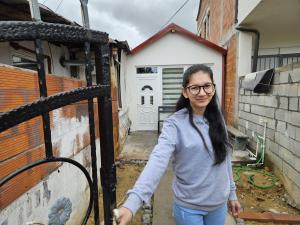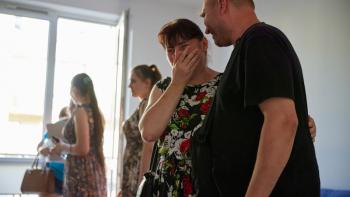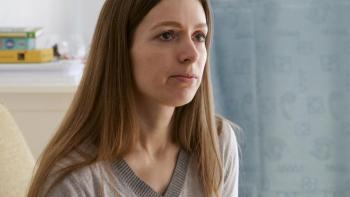Build better lives
On the 29th August 2023, ahead of the second EPBD trilogue under the Spanish Council Presidency, 67 civil society organisations, social, health and environmental NGOs, trade unions and youth movements across Europe have signed onto a joint statement calling on their elected representatives to deliver an ambitious and socially just EU Buildings Directive (EPBD) before the end of the year.
On the 29th August 2023, ahead of the second EPBD trilogue under the Spanish Council Presidency, 67 civil society organisations, social, health and environmental NGOs, trade unions and youth movements across Europe have signed onto a joint statement calling on their elected representatives to deliver an ambitious and socially just EU Buildings Directive (EPBD) before the end of the year.
The ‘trilemma’ of rising energy costs, a cost of living crisis and a climate emergency have arrived at our front doors, with millions of households having to choose between eating or heating. Making our homes and buildings energy efficient and renewable-based is the answer to these issues as it can help reduce our dependence on dangerous, expensive and volatile fossil fuels, help shield people from energy poverty, and improve air quality while also combatting the climate crisis.
This starts with a strong EU policy framework, along with investments and resources that can be directed towards activating the relevant actors on the ground who can make the transition in our buildings a reality. Creating more energy efficient homes saves us energy and money, protecting the right to a comfortable and healthy living environment for all.
You can read the joint statement here.
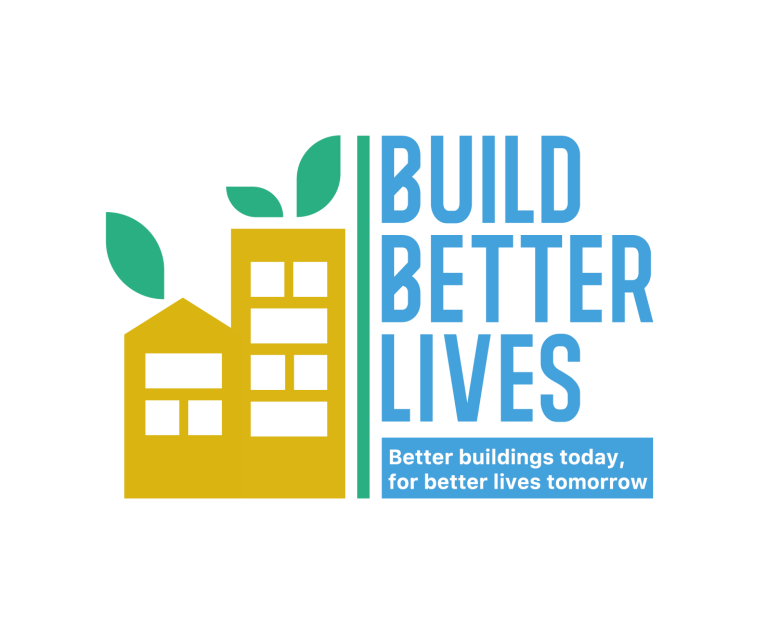
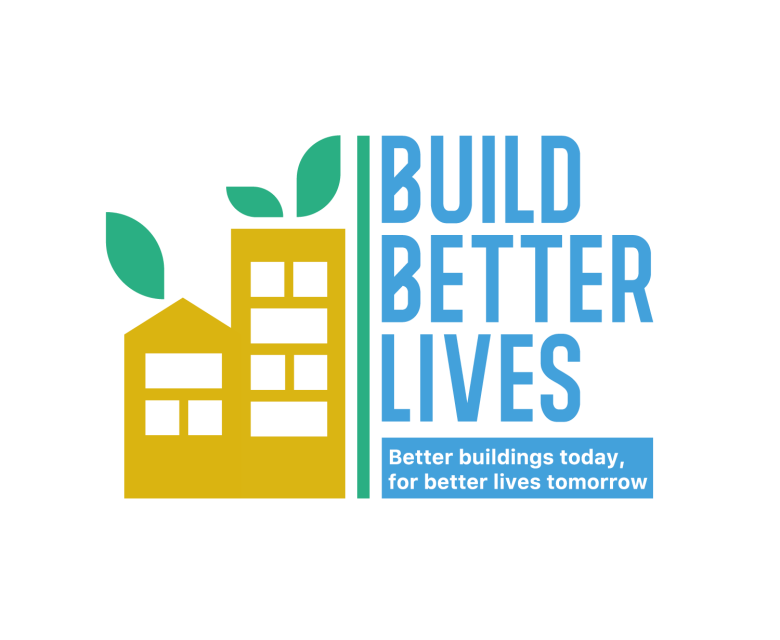
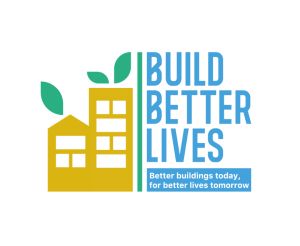
Habitat for Humanity and Miyamoto Relief partner to support Turkey's earthquake-affected communities
A mother's journey to building home, future, and hope for herself and family
Iryna, a new mother, found herself saying things she never expected. On an ordinary day in February, her life and her family’s life took a sudden turn. This one event forced her to make a decision that would change everything forever.
“Mum, are those fireworks?”
“No, dear. It’s the beginning of the war.”
Iryna, a new mother, found herself saying things she never expected. On an ordinary day in February, her life and her family’s life took a sudden turn. This one event forced her to make a decision that would change everything forever.
Iryna, with her mother Tetiana and infant son Sava, had to leave Odesa in Ukraine in search for safety. Her husband and her father stayed back in Ukraine to serve the Ukrainian Armed Forces. Alone and unprepared, Iryna and her mother embarked on a journey full of uncertainty.
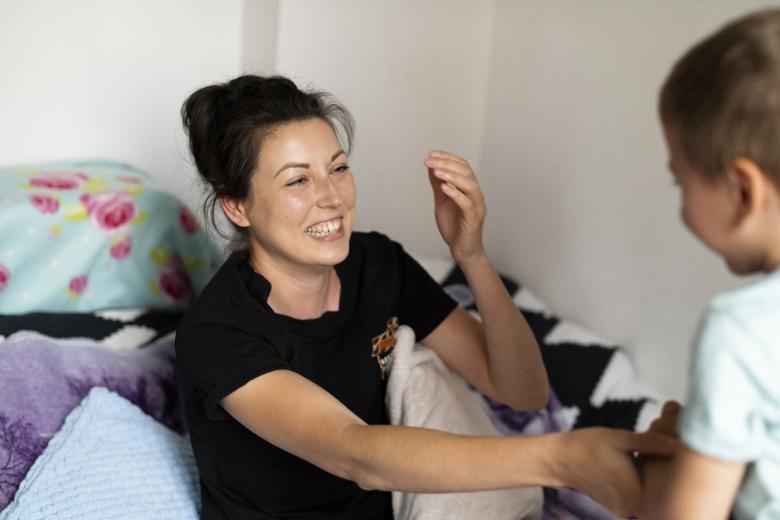
“At the time, I was sure the war wouldn't last long—just a few months, and we'd be back,” Iryna recalls, thinking back to that day.
Amid the chaos, Iryna and her mother joined the other women and children seeking safety. Remarkably, Sava, just a nursing baby, was among them. On March 9, 2022, they arrived to Poland. With no familiar faces or friends to help them, these strong women showed an extraordinary spirit that carried them through this tough time.
Tetiana, Iryna’s mother, remembers her daughter’s incredible drive, especially during the darkest hours. It was Iryna’s determination that kept them going, her focus on protecting her mother and son, and on building a place they could call home.
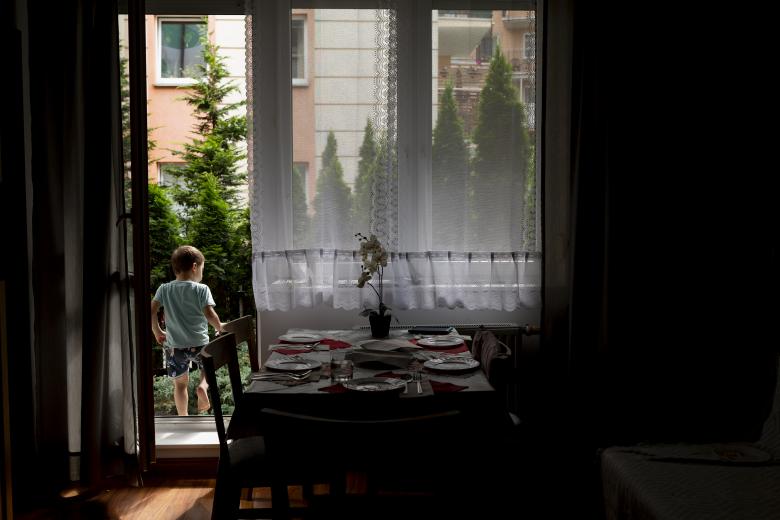
“I never really thought about what a ‘home’ means before—it was just where you returned each day. But now, after everything, and after coming to Poland, I’ve come to realize that home is where safety resides, where your soul finds peace. Home is like a stronghold, where you’re surrounded by love and smiles await you—a place of safety. Every mother wants that secure place for her children.”

Today, Iryna and her family can say they’ve found their home in Poland. The kindness and support of the Polish people helped them find comfort and move past the hardships and terrors of war.
“Today, we can fall asleep and rest peacefully until morning,” Iryna says. “We’re surrounded by care and empathy. Many kind people have helped us move past our difficult experiences. We want to thank the Polish people for their kindness and support. With the help of Habitat for Humanity Poland, we’re rebuilding our life. The incredible hospitality we’ve experienced makes us want to extend a helping hand to others who are struggling, to help them find happiness in Poland like we did. Just as Warsaw and the whole country helped us, we want to give back the warmth and support we’ve received!”
In a world of uncertainty, Iryna’s story shows the unbreakable spirit of families seeking safety and unity. Through her courage and the warmth of the Polish people, Iryna has paved a path for her family, proving that even in tough times, hope and resilience can light the way.
Learn more

A mother's journey to building home, future, and hope for herself and family
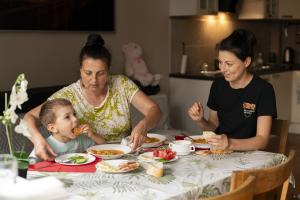
HFHI Human Resource Learning and Organisation Development team participate in a build in Machakos, Kenya
Habitat for Humanity’s Human Resource Learning and Organisation Development (HRLOD) team participated in a build in Machakos County, Kenya. This is one of the special builds organised to give staff hands on experience in the field and make them connect with the mission.
“Today the lion of Judah has descended upon my home. He has wiped away my tears,” exclaimed Mary with her hands in the air in exaltation.
As the house kept taking shape, it was evident that the life of Mary 57-year-old mother of 3 and a grandmother to 2 children all of whom are living with disabilities would change for good.
Mary had to squeeze her big family of seven (7), in a small house with rusted corrugated iron sheets without a toilet and bathroom. The 7 include her three (3) daughters who are living with varied disabilities, and her two (2) grandchildren born of her now divorced daughter for bearing children with disabilities.
Habitat for Humanity’s Human Resource Learning and Organisation Development (HRLOD) team participated in a build that will change Mary’s life in Machakos County, Kenya. This is one of the special builds organised to give staff hands on experience in the field as opposed to the office environment that defines their scope of work.
HR LOD team members at the build site in Machakos, Kenya.
ICF Technology
The build that was organised in collaboration with HFH Kenya under Habitat’s Vulnerable Group Housing Program involved the use of Onsite ICF technology. This technology by our start-up partners OnsiteICF, produces blocks are a replica of play castle blocks, but are bigger in size and lighter in weight.
The technology is convenient, easy to use and very cost effective reducing the overall cost of construction. The result is a permanent house with added benefits like sound and thermal Insulation, pest resistant, reduced water absorption and fire retardant. The technology is also eco-friendly as it involves use of polyurethane materials that prevent land excavations which is a prerequisite of other methods.
ICF blocks pictured at a build site.
The technology , which has also been replicated in other HFH Kenya projects in Laikipia is one of the many technologies that HFHI uses to make access to affordable housing a reality.
The HRLOD team together with masons from the On-site ICF, were all immersed into activity that will revive the hope of Mary’s family. From carrying building blocks, to arranging them to make walls , to mixing ballast and fixing steel rodes.
From left: Ivan Kyselica Learning & Organisation Development Manager EME - Area Office; Joylyne Toroitich, Specialist HR Africa; and Jackie Athieno the Director Human Resource Business Partner fixing block at a build site in Machakos, Kenya.
Jackie Athieno the Director Human Resource Business Partner emphasized on the importance of having the team , which in most cases work within the confines of the office participate hands on in the build.
“It is a great way to connect with HFHI’s value of humility, there is something bigger but in all of us, in our own small ways we can change the world one person at time.”
At Habitat for Humanity, we are guided by the values of humility, courage and accountability; “It is such a wonderful experience for me seeing how a one-day effort would change the life of Mary’s family”.
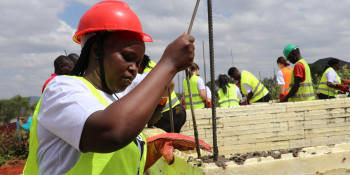
HFHI Human Resource Learning and Organisation Development team participate in a build in Machakos, Kenya
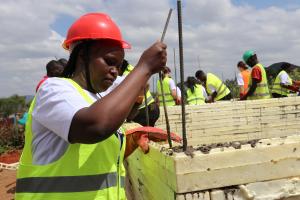
Umdasch Group supports Habitat for Humanity on construction projects
BRATISLAVA (May 27, 2023) — Habitat for Humanity International is pleased to announce a new partnership with Umdasch Group, an Austrian-based group of companies active in the construction and retail sector.
Bratislava (May 27, 2023) — Habitat for Humanity International is pleased to announce a new partnership with Umdasch Group, an Austrian-based group of companies active in the construction and retail sector.
The partnership will focus on sponsorship of house constructions and support of the Carter Work Project. Employees of the Doka subsidiary, who specialize in innovative formwork and scaffolding solutions in all areas of construction, will engage in international volunteering events on construction projects in the United States.
“By supporting Habitat in the USA, we can closely dovetail our social commitment with our corporate strategy and thus achieve the greatest possible impact with our available means and resources,” said Wolfgang Litzlbauer, CEO of the Umdasch Group.
The Carter Work Project, an annual home building event organized by Habitat for Humanity and its affiliates, takes its name from the former U.S. president Jimmy Carter and the first lady, Rosalynn, who are celebrated as Habitat’ most famous volunteers. Together, from 1984 until 2019, they served as champions and strong voices for decent, affordable housing around the world, having worked alongside more than 104,000 volunteers in 14 countries to build, renovate and repair 4,390 homes during that time.
“We are grateful for engaged partners such as Umdasch Group, promoting innovative solutions to make construction processes more transparent and sustainable, and helping Habitat build a world where everyone has a decent place to live,” said Rick Hathaway, Habitat’s vice president for Europe and the Middle East.
About Habitat for Humanity
Driven by the vision that everyone needs a decent place to live, Habitat for Humanity began in 1976 as a grassroots effort on a community farm in southern Georgia. The Christian housing organization has since grown to become a leading global nonprofit working in local communities across all 50 states in the U.S. and in more than 70 countries. Families and individuals in need of a hand partner up with Habitat for Humanity to build or improve a place they can call home. Habitat homeowners help build their own homes alongside volunteers and pay an affordable mortgage. Through financial support, volunteering or adding a voice to support affordable housing, everyone can help families achieve the strength, stability and self-reliance they need to build better lives for themselves. Through shelter, we empower. To learn more, visit habitat.org.
About Umdasch Group
The internationally successful Umdasch Group is active in more than 60 countries at over 170 locations and currently employs around 8,500 people worldwide. The family-owned company is the holding company for three operating divisions. Doka is one of the world’s leading companies for innovative formwork solutions and services in all areas of construction. In addition, the company is a global supplier of sophisticated scaffolding solutions for a wide range of applications. umdasch The Store Makers is a specialist in the design of shop interiors. Consulting and project management make the company an important partner for the retail industry, especially when it comes to innovative concepts for combining traditional stores with online retail. Umdasch Group Ventures is the technology driver and develops new, groundbreaking solutions and business models in both construction and retail.
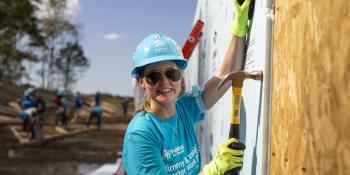
Umdasch Group supports Habitat for Humanity on construction projects
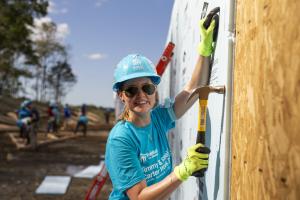
Partnerships and inclusivity are central to achieving SDGs
The second session of the UN Habitat assembly took place in Nairobi Kenya from 6th – 9th June 2023 under the theme “a sustainable urban future through inclusive and effective multilateralism: achieving the Sustainable Development Goals in times of global crises”.
The second session of the UN Habitat assembly took place in Nairobi Kenya from 6th – 9th June 2023 under the theme “a sustainable urban future through inclusive and effective multilateralism: achieving the Sustainable Development Goals in times of global crises”.
The event brought together over 6000 delegates from around the world to discuss universal access to adequate housing, Urban climate action, urban crisis recovery, localization of SDGs among other topics.
Speaking at the opening of the Assembly, Kenya’s President His Excellency Dr William Samoei Ruto noted that access to sufficient and affordable finance is a major barrier to achieving sustainable urbanization and climate action in the Global South and Africa in general. “This gathering is an opportunity for the global community to reflect on progress and new possibilities for sustainable provision of opportunities and amenities that promote the flourishing of nearly 10 billion people while enhancing the earth’s capacity to support life.” said President Ruto.
Climate change impacts and cities
The Executive Director of the UN Habitat Ms Maimunah Mohd Sharif, noted the precedence of sustainable urbanization towards achieving climate goals, Paris Agreement and aspirations to keep global warming within 1.5 degrees.
Ms Maimunah acknowledged that cities are at the centre of the impacts of extreme climate events, natural disasters, conflicts, global pandemics and economic crises: “The reality is that the impact of crisis are felt first and foremost in cities. Their secondary effects often long term in nature and are also felt in urban areas. Unfortunately, humanity over-reliance on carbon and consumption is not only killing our planet but also leaving some 3billion people without adequate housing, with 1.5 billion currently residing in poor and unhealthy housing
“The challenge before us is enormous. The only way we can achieve positive and transformative impact on the ground is through multilateral action”, she added.
Stephen Seidel, Senior Director Technical Partnerships and Program Effectiveness, Habitat for Humanity presenting Habitat for Humanity’s statement at a High-Level dialogue session attended by Member States.
Habitat for Humanity participated in the Assembly through its delegation drawn from the global teams, Africa Area office and various National Organizations. The team presented a statement at a High Level dialogue session attended by Members States. The statement read by Stephen Seidel, Senior Director Technical Partnerships and Program Effectiveness emphasized Habitat for Humanity’s commitment for continuous collaboration with Member States and allies to realise a sustainable urban future.
How to achieve affordable housing for all
From Left: Hon. Nga Kor Ming, Malaysia’s Minister for Local Government Development; His Excellency Eng. Mohammed Ibrahim Al Mansoori, Director General of Sheikh Zayed Housing Programme; and Maurice Makoloo, Africa Area Vice President, Habitat for Humanity at a side event hosted by Malaysian government during the second session on the UN Habitat Assembly.
Speaking at a side event hosted by the Malaysian government under the theme- ‘Need for Balance: Affordable Living Housing For All’ Habitat for Humanity Africa Vice President Maurice Makoloo said:”The challenges we face in adequate and affordable housing require multiple actors and actions. Partnerships are the way of the future and to the future, we need to address housing as an ecosystem and tackle the challenges experienced in the supply chain.”
Various side events were chaired by different special interest groups. Among them the Youth and women caucuses.
“There is need to involve the youth in SDG conversations. If we have the numbers it means our inputs, voices, and contributions should be given a consideration because we are the population that is greatly affected. If by 2050, the worlds half population will be living in urban centres, this means that the youth in Africa will be living in the urban centres. The youth in Africa will need adequate housing. Therefore we should be give a chance to determine what we need and how to address our problems” said Roseline Lelaono Safeguarding Intern at Habitat for Humanity in Africa.
Partnerships and inclusivity are central to achieving SDGs
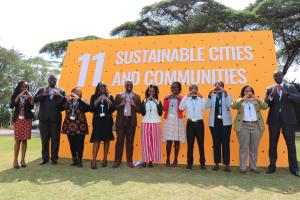
Residential energy efficiency: A key to a more sustainable future
Residential energy efficiency is driven by the need to address energy poverty, which affects over 40 million people across the EU, particularly the elderly and low-income households, and remains a significant barrier to achieving a more sustainable future for all.
Residential energy efficiency is driven by the need to address energy poverty, which affects over 40 million people across the EU, particularly the elderly and low-income households, and remains a significant barrier to achieving a more sustainable future for all.
In 2021, 6,9 % of the EU population could not keep their homes adequately warm. In 2022, this percentage rose to 8 %, corresponding to an estimated 40 million of energy poor people, according to the EU statistics on income and living conditions (EU-SILC)[1]. Energy poverty can lead to increased greenhouse gas emissions and exacerbate climate change, as households may resort to using fossil fuels or inefficient energy sources to meet their energy needs. Furthermore, energy poverty can also have a negative impact on people’s health, their social inclusion and economic development.
Our Community Tailored Actions for Energy Poverty Mitigation, or ComAct [2], project, funded under the European Union’s Horizon 2020 program, targets energy-poor people in five pilot countries: Bulgaria, Hungary, Lithuania, North Macedonia and Ukraine. A survey of over 1,000 people across those five countries conducted under ComAct project in 2021 found that 37% of respondents above 60 years old spend more than 15% of their income on energy, more than 34% are unable to keep their homes warm and almost 54% are unable to keep their homes cool. These results offer an insightful glimpse into the problems and challenging conditions faced by people in multi-family apartment buildings in Central and Eastern Europe and correspond to the findings of the EU-SILC survey, which also shows how energy poverty disproportionately affects low-income households. Over 34% of households in the lowest income quintile reported that they cannot afford to keep their homes warm, compared to 3,4% of households in the highest income quintile with over 42% of households citing high energy cost as the main reason. Moreover, the survey revealed that the prevalence of energy poverty varies greatly depending on the type of dwelling. People living in buildings with poor thermal insulation and inefficient heating systems were more likely to experience energy poverty than those living in energy efficient buildings. All of these findings highlight the importance of efforts and interventions that promote energy efficiency to reduce energy poverty, which is a significant barrier to sustainability.
The importance of energy efficiency is well recognized by the EU, which placed the EU-wide energy poverty definition into the new Energy Efficiency Directive for the first time, showing that energy efficient interventions are the way to reduce energy poverty and signalling the need for addressing it.
The European Union has set ambitious goals for reducing greenhouse gas emissions with the ultimate aim of reaching net-zero emissions by 2050. More specifically, as part of the EU’s overall goal to achieve climate neutrality by 2050, it aims to reduce greenhouse gas emissions by at least 55% and increase the share of renewable energy in the EU’s energy mix to at least 32% by 2030.
Since buildings are responsible for a significant amount of energy consumption in the EU, accounting for 40% of the EU’s final energy consumption and 36% of greenhouse gas emissions, increasing the energy performance of new buildings, improving energy efficiency of existing buildings and decreasing household’s energy poverty is, therefore, essential to achieving the EU’s climate and energy objectives.
[1] prediction based on the information from a presentation from the European Commission’s Directorate-General for Energy (April, 2023)
[2] The ComAct project, coordinated by Habitat for Humanity, Europe and the Middle East area office, aims to make impactful energy-efficient improvements in multi-family apartment buildings affordable and manageable for energy-poor communities as well as to create the necessary assistance conditions for lifting them out of energy poverty. The project includes ten partners: MRI, IWO, LCA, ENEFFECT, BURGAS, OHU, Habitat for Humanity Macedonia, ENOVA, Habitat for Humanity Europe and the Middle East.
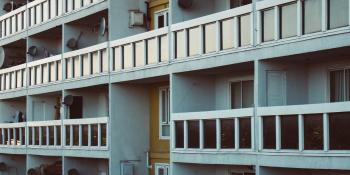
Residential energy efficiency: A key to a more sustainable future
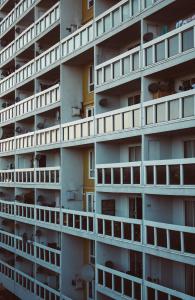
Home Equals campaign
More than 1 billion people around the world live in slums and other informal settlements, and that figure continues to rise. Informal settlements have very limited access to basic services such as clean water, sanitation and electricity. The poor living conditions are a physical manifestation of inequities holding back far too many families and communities.
We are no longer afraid of the cold. Celebrating International Romani Day in North Macedonia.
Over half of Roma families experience housing deprivation across the European Union. “Being part of Habitat Macedonia’s project, at first for the legalization of our home, and then for its refurbishment, gave us hope that we can raise our children in decent conditions.”
Nada welcomes us with a smile on a cold April morning in her small house located in the narrow streets of Shuto Orizari, the only Roma municipality in Europe.
“We are no longer afraid of the cold. Our children are sleeping in a warm and dry place for the first time in their lives.
“We are grateful that Habitat turned our little house into a warm home, that you helped us legalize it and be our own,” shares Nada, currently unemployed.
She is the mother of a twelve-year-old girl, who goes to a local primary school, and an eight-year-old boy, who has to stay home due to his health condition and frequent hospital treatments.
“My husband, our two children and I, we all used to live in about twenty square meters: one room without insulation, with a cold concrete floor, and an unfinished bathroom. It was difficult for me to maintain hygiene, it was impossible to clean, I washed the dishes at the tap outside. It was cold.
“My son’s health condition requires constant care, daily inhalations, hygiene and warmth. Being part of Habitat Macedonia’s project, at first for the legalization of our home, and then for its refurbishment, gave us hope that we can raise our children in decent conditions.
“I can see the children’s health improving, hygiene is now as it should be, we have an adequate toilet and kitchen, and a space to sleep peacefully.”
Before the intervention, their small house had bare walls, no flooring, no plumbing in the kitchen and an unfinished toilet. Thanks to the renovation works, their living conditions have improved, and they can now enjoy a healthy home.
Hers is one of the 12 substandard homes undergoing refurbishment within the project ‘Sustainable Urban Development of Roma Communities’. A joint initiative of Habitat for Humanity Macedonia and the municipalities of Shuto Orizari and Veles, financed by the European Union.
Nada’s family shares the same problems as 60-70% of the estimated 50,000 Roma living in Macedonia – often recipients of social assistance. Lacking a stable income, they often live in substandard, illegal housing, without access to proper sanitation.
Over half of Roma families experience housing deprivation across the European Union, according to the EU Roma Survey from 20221. More than 70% of young Roma still leave school early, and Roma continue to have a much lower life expectancy than the general population.
Habitat Macedonia has been working for almost two decades on improving the housing conditions of the Roma population through various programs.
We focus our efforts on empowered participation, secure tenure, access to reliable and sustainable basic services as well as the eradication of energy poverty. On International Romani Day, let us remember that urbanization and improvement of living conditions is the basis for the social inclusion of Roma in the community, enrolment in education and improved health.
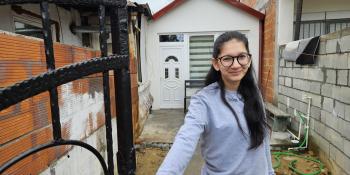
“We are no longer afraid of the cold”. Celebrating International Romani Day in North Macedonia.
